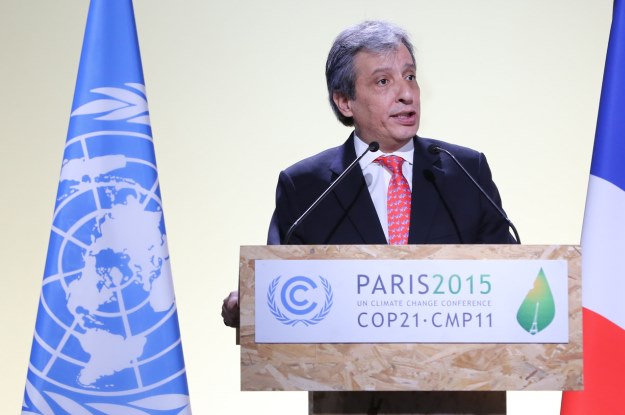On the opening day of international climate change talks in Paris this week, Manuel Pulgar Vidal, Peru’s environment minister, officially handed over the presidency of the United Nations Conference of Parties (COP) to French Foreign Minister Laurent Fabius.
AQ sat down with the minister to talk about Latin America’s role in climate negotiations in Paris and beyond.
AQ: While 98 percent of countries have submitted carbon reduction pledges to date, a few Latin American states, most notably Venezuela, have not done so. How has Latin America acted as a region in the climate change debate?
Manuel Pulgar Vidal: Latin America cannot be seen as a unified region when it comes to the climate change debate. As I often say, economic alliances do not always present themselves in the same way when it comes to the climate.
To that end, each country needs to make its own decisions. But what is clear is that any country that refuses to adopt certain measures now is one that will lose out given the new focus that the rest of the world is adopting. Decisions taken this year will determine how development will occur in the world in the years to come.
The world in 2030 will undoubtedly be a very different place. Countries therefore need to be part of changes now, meaning that they have to innovate, prepare, change and improve policies and see better governance.
AQ: Putting a price on carbon is one of the themes that has been discussed here in Paris, with the leaders of Mexico, Chile, Canada, Ethiopia, France and Germany calling for other countries to follow their examples. How does the rest of the region stand on the issue of carbon pricing?
Pulgar Vidal: We believe that a constructive discussion on the elimination of fossil fuel subsidies is needed. A worldwide analysis of fossil fuel subsidies was done in which Peru was shown to have a positive or efficient subsidy, called the Energy Inclusion Fund program. This program improves people’s access to natural gas as an alternative to burning wood that otherwise generates pollution and deforestation. Peru is also moving to eliminate any inefficient subsidies.
But let me tell you something: Certain processes are inevitable, and carbon pricing and the elimination of fossil fuel subsidies will take place sooner rather than later.
Multilateral organizations such as the World Bank, the Inter-American Development Bank, the European Finance Bank or other organizations such as the OECD are the ones that are generating this discussion. So it is really obvious that one has to be part of the debate, rather than remain outside of it.
AQ: Since the opening of the Paris climate talks, a number of indigenous groups from the Amazon have highlighted how deforestation is affecting their cultures and livelihoods, and suggested that the UN’s REDD+ mechanism is too lax. Do you expect progress to be made on the issue of forests within the international discussions?
Pulgar Vidal: I think that valid and legitimate demands exist for the recognition of indigenous rights.
The REDD+ mechanism already addresses this to a certain degree. But it is important to realize that a series of other measures need to accompany the adoption of international mechanisms, such as the REDD+, on a national level. I think this should be the case regarding ownership. There should be a mechanism to address the issue of people lacking formal propery titles who may be deprived of their rights.
While additional actions can support REDD+, the mechanism itself does not resolve everything. A combination of measures, political will and application of consulta previa is what will bring solutions.
AQ: What sort of progress have you seen in the global fight against climate change since you assumed the COP presidency?
Pulgar Vidal: Progress and change have taken place because, as the climate change debate has evolved, a number of points have converged to create greater awareness.
First of all, we have the 2015 deadline for concluding a new agreement, but also for achieving a better understanding of the problem and better press coverage, increasing the capacity to inform people about what we are seeking and what should be achieved.
Secondly, scientific information has also improved significantly. The work done by the Intergovernmental Panel on Climate Change (IPCC) has been essential. Thanks to them, we know that we must not exceed more than 1.5 to 2 degrees Celsius (of global warming) and are warned that if we do so, there will be serious consequences.
The third point is the INDC mechanism, or the programs that countries present detailing how they will mitigate climate change within a given timeframe and how they will adapt to climate change. The mechanism exists not only to generate confidence, but also to promote internal discussions. In many cases, such as in Peru, the process for formulating the INDCs was a participative one, involving discussions on forest management, industrial processes, better transportation, better waste management, and other things.
A fourth element is the issue of climate finance, as possibly billions of dollars in funds may be accessible before 2020. This would allow countries and organizations – as well as civil society and indigenous peoples – to be better prepared for the consequences of climate change.
Many new climate change laws now also exist. And while laws may not resolve everything, they do reflect the changes in the political will to improve behaviors to fight climate change, and to achieve an international agreement this year.
The above is the transcript of a conversation that took place in Paris on December 1, 2015. It has been edited for length and clarity.
—
Paula Dupraz-Dobias is a freelance journalist regularly writing about Latin America for international media sources.







